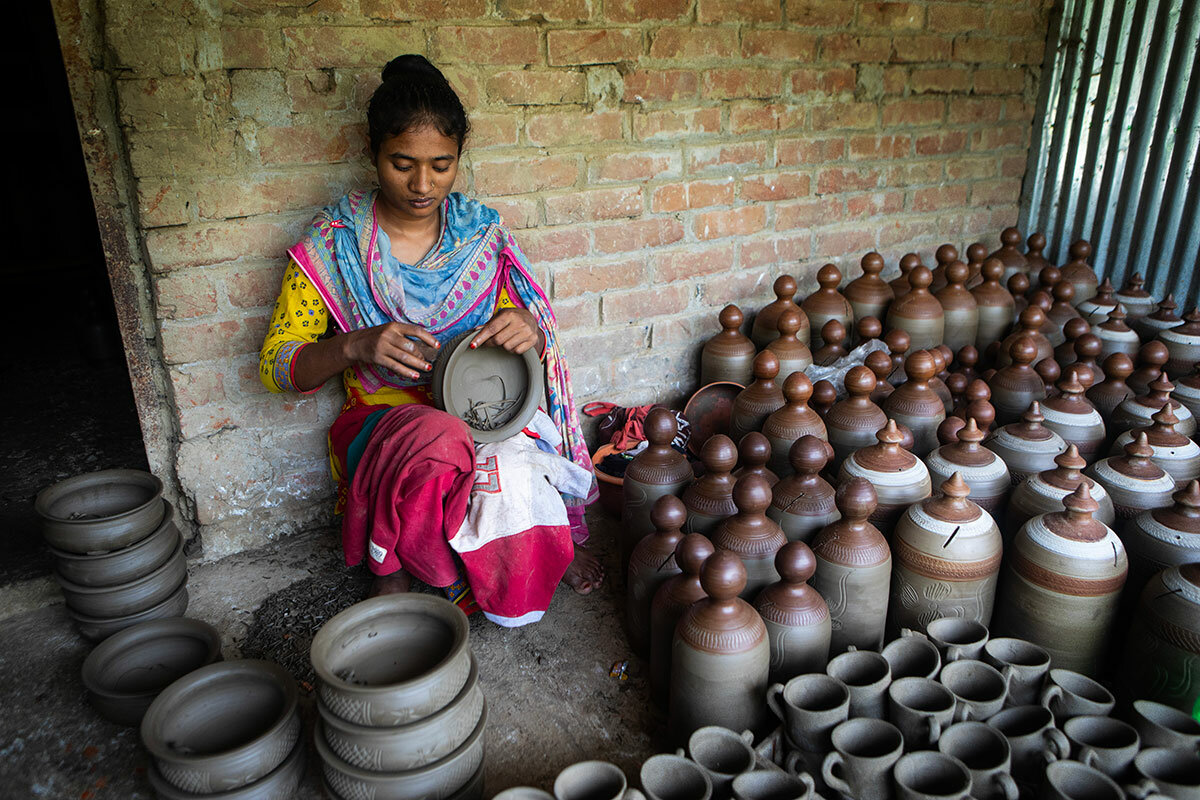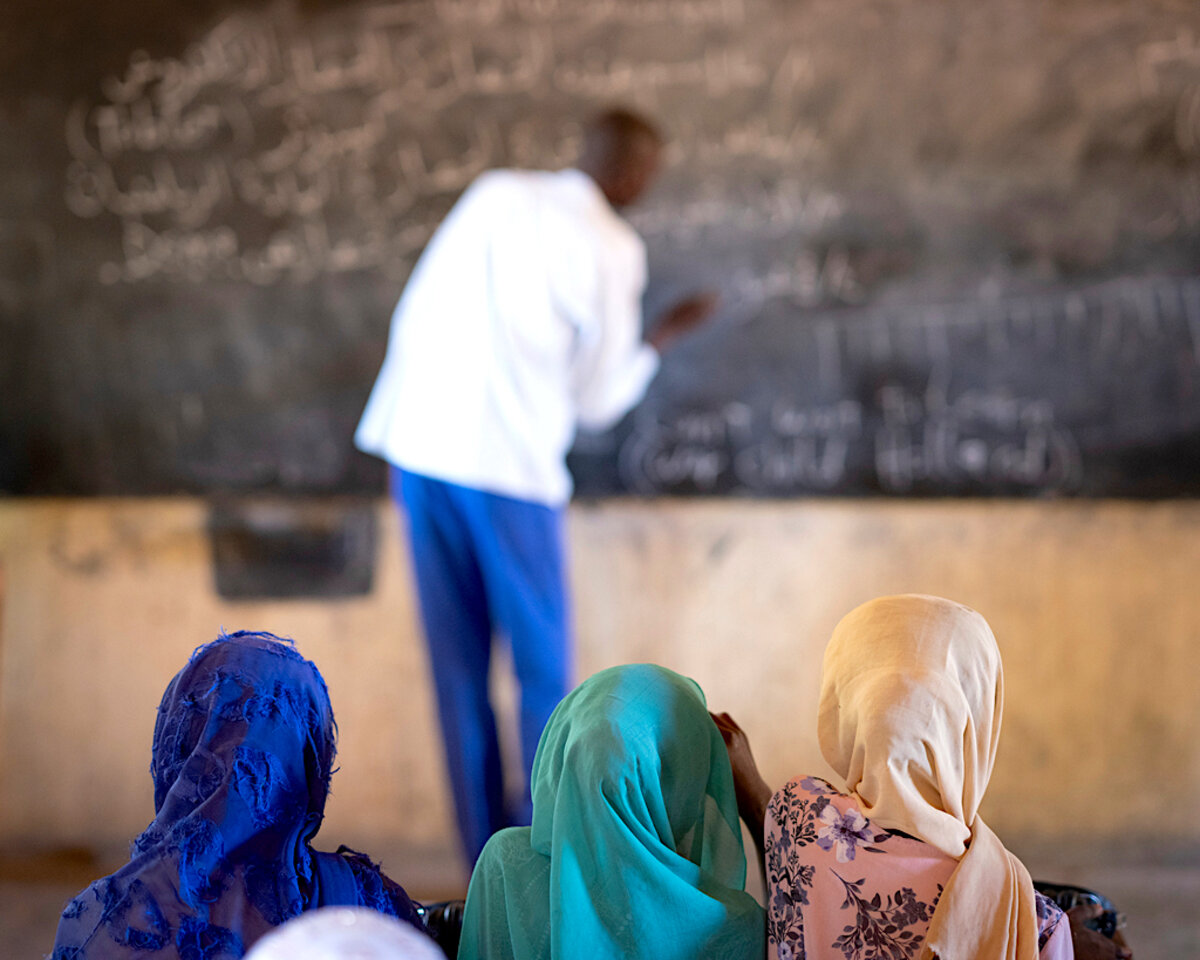What originally looked like a long shot effort to keep Donald Trump off the ballot has picked up momentum that is likely to carry it to the Supreme Court. What will this mean for the 2024 election?

Why is Christian Science in our name?
Our name is about honesty. The Monitor is owned by The Christian Science Church, and we’ve always been transparent about that.
The Church publishes the Monitor because it sees good journalism as vital to progress in the world. Since 1908, we’ve aimed “to injure no man, but to bless all mankind,” as our founder, Mary Baker Eddy, put it.
Here, you’ll find award-winning journalism not driven by commercial influences – a news organization that takes seriously its mission to uplift the world by seeking solutions and finding reasons for credible hope.
Explore values journalism About usMonitor Daily Podcast
- Follow us:
- Apple Podcasts
- Spotify
- RSS Feed
- Download
 Mark Sappenfield
Mark Sappenfield
Salvadorans are ready to essentially give up on democracy, and no wonder. Today’s Daily explores how democratic rule failed to lower the country’s crushing murder rate. President Nayib Bukele has done better, so Salvadorans aren’t complaining as he now runs roughshod over the constitution.
But our story on a gifted program in a New York school notes something else important. A community’s real power is in its people’s potential. Failing to capitalize on that means squandering huge amounts of human capital. El Salvador may have good reason to turn from democracy, but ultimately, only democracy can unleash the full potential of its people.
Already a subscriber? Log in
Help fund Monitor journalism for $11/ month
Monitor journalism changes lives because we open that too-small box that most people think they live in. We believe news can and should expand a sense of identity and possibility beyond narrow conventional expectations.
Our work isn't possible without your support.
Today’s stories
And why we wrote them
( 5 min. read )
Today’s news briefs
• Iran bomb attack: Two bomb blasts kill at least 95 people at an event honoring a prominent Iranian general who was slain in a United States airstrike in 2020. It appears to be the deadliest militant attack in Iran since the 1979 Islamic Revolution.
• Scandinavian deep freeze: Temperatures fall below minus 40 degrees Fahrenheit in Sweden for the second day in a row – the coldest January temperature recorded in the Nordic region in 25 years.
• Trump appeals Maine ruling: Donald Trump appeals his disqualification from Maine’s primary ballot. Maine’s Democratic secretary of state decided that Mr. Trump violated a state ban against people who “engaged in insurrection” holding office.
• Texas emergency-abortion ban: The U.S. government cannot enforce federal guidance in Texas requiring emergency room doctors to perform abortions if necessary to stabilize emergency room patients, a federal appeals court rules.

( 5 min. read )
El Salvador’s Nayib Bukele tackled violence in a way citizens have craved for decades. But should that give him the right to run for reelection, something that’s constitutionally banned?
( 6 min. read )
How can the United States make sure all students who are capable of advanced work are given that opportunity? Politicians and educators are leaning toward gifted programs that are more inclusive.
( 5 min. read )
When resources are slim, it can be hard to build community. In Ecuador, one couple has found that a love of literature can help bring people together.
A Letter From
( 5 min. read )
A day in Kushtia, Bangladesh – a city that’s off the beaten path but brimming with history and culture – provided Monitor journalists a reprieve, as well as a deeper appreciation for one of the region’s youngest nations.
The Monitor's View
( 2 min. read )
How does a democracy become more honest? The question is worth asking in light of the most recent measure of public attitudes about corruption across Africa.
In the last 20 years, all but five African countries have ratified a joint convention to “prevent, detect, punish and eradicate corruption and related offences in the public and private sectors.” Yet across 39 countries, 2 in 3 Africans say their government is failing to curb corruption, according to an Afrobarometer survey published at the end of 2023. Just 1 in 4 say they can report corruption without fear of retaliation, while 58% say corruption has increased “somewhat” or “a lot” during the preceding year.
Rather than cause for pessimism, however, those views may reflect how the continent’s shared aspirations for more integrity have elevated public demand for it, expressed through citizen engagement. Sierra Leone provides a useful example.
Not without controversy, the West African country has made some of the most consistent progress in global corruption rankings in recent years among African states. It has climbed 20 rungs on Transparency International’s Corruption Perceptions Index in the past six years. The Millennium Challenge Corp., an initiative to support good governance created by the U.S. Congress, gave it a score of 76% for “control of corruption” - a high mark it has consistently achieved during the same interval.
Sierra Leone’s bid to uproot corruption is part of the country’s gradual restoration of democracy after a civil war during the 1990s. The country sought to heal its wounds through a traditional form of transitional justice. It has now had two consecutive peaceful transfers of power – still an exception in Africa. It now has a 98% completion rate in primary school, with girls outnumbering boys.
To counter corruption, the government has sought a balance between aggressive law enforcement and the protection of individual rights. A constitutional anti-corruption commission has the power to conduct raids without warrants. But it also carries out cooperative audits with government agencies meant to identify and fix irregularities. Whistleblowers are empowered. Public services like hospitals and police stations are required to provide information about how citizens can file complaints.
Critics claim the government targets its political opponents and harasses journalists, but its focus on corruption has also encouraged public participation. Last August, for example, 40 civil society organizations held a summit to coordinate their own anti-corruption initiatives – including holding the government in check. That had never happened before.
In the Afrobarometer survey, just 11% of Africans listed corruption as their top concern. Their priorities included unemployment, management of the economy, health care, clean water, and education – all of which require honest and accountable governance. “On a continent where governments struggle to raise revenues to provide for citizens’ basic needs,” the survey concluded, “most Africans see [corruption] as worsening and their leaders’ anti-corruption efforts as inadequate.”
That lament carries a message reaching across Africa – that encouraging an expectation of honest governance becomes a catalyst for it.
A Christian Science Perspective
Each weekday, the Monitor includes one clearly labeled religious article offering spiritual insight on contemporary issues, including the news. The publication – in its various forms – is produced for anyone who cares about the progress of the human endeavor around the world and seeks news reported with compassion, intelligence, and an essentially constructive lens. For many, that caring has religious roots. For many, it does not. The Monitor has always embraced both audiences. The Monitor is owned by a church – The First Church of Christ, Scientist, in Boston – whose founder was concerned with both the state of the world and the quality of available news.
( 3 min. read )
Letting God inspire our progress and healing can bring light to the new year.
Viewfinder
Palestinian children play during the Eid al-Adha holiday, in Gaza City, June 6, 2025.

A look ahead
Thank you for joining us today. We hope you’re enjoying our news briefs feature in the Daily, which we started yesterday. We’re eager for feedback. You can reach me at editor@csmonitor.com.
Tomorrow we’ll look at the widespread concern in some quarters that a second presidential term for Donald Trump could destroy American democracy. Are the worries overheated or on target? We’ll examine the various arguments and lay out the facts we know at this point.







